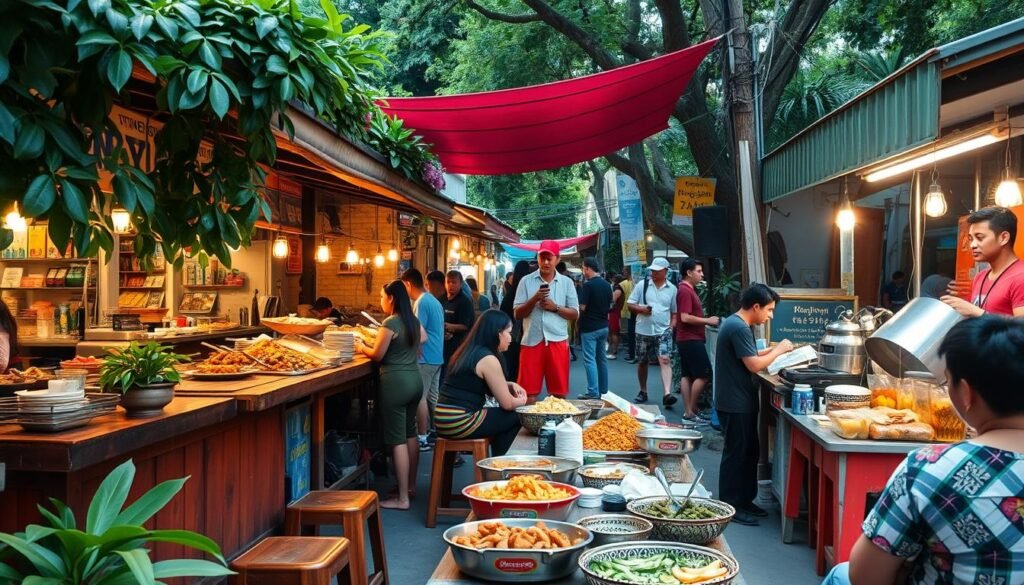Working remotely from anywhere in the world is exciting, but, it comes with its own financial challenges. You need to manage costs for places to stay, travel insurance, and transport. It’s not just about saving money; it’s about planning your budget wisely for a fun and affordable journey.
Key Takeaways
- Choosing affordable destinations is crucial for maintaining a budget.
- Utilizing loyalty programs and seeking local discounts can save money on food expenses.
- Popular budgeting methods include zero-based budgeting, the envelope system, and the 50/30/20 budget rule.
- Track your expenses using tools like Excel spreadsheets to understand your income and spending patterns.
- Experts recommend saving at least six months’ worth of living expenses before starting your digital nomad journey.
Understanding Your Income Sources
As a digital nomad, knowing where your money comes from is key to staying financially stable. Having different ways to earn can make your life more stable, lower risks, and help you keep up your lifestyle.
Identifying Multiple Income Streams
Many digital nomads mix up their income by working remotely, freelancing, and earning passive income. Sites like Upwork, Fiverr, and Freelancer help you find freelancing jobs. This way, you can earn more and feel safer financially.
Forecasting Income Fluctuations
It’s important to plan for changes in your income when you’re a digital nomad. Freelance work can be unpredictable, and jobs might not always be there. Having a safe income plan helps you get through tough times.
Setting Up an Emergency Fund
Having an emergency fund is a smart move for financial stability. Studies show that digital nomads with a fund for three to six months of expenses are more ready for surprises. Saving a bit of your income regularly can give you peace of mind and security for the future.
Creating a Realistic Budget
For digital nomads, making a budget is key to staying financially stable. By tracking your spending, grouping costs, and focusing on needs over wants, you can save a lot. This is crucial when you’re traveling and handling remote work expenses.
Tracking Your Expenses
Keeping an accurate record of your spending is vital. Apps like Mint or EveryDollar can help you log your daily costs. This way, you can see where your money goes and find ways to save.
For example, doing laundry in places like Bali and Thailand can be cheaper than hotel services. It costs about $2 USD per kilogram.
Categorizing Fixed and Variable Costs
It’s important to know the difference between fixed and variable costs. Fixed costs are things you can’t change, like rent and insurance. Variable costs change and include things like dining out and travel.
Using the 50/30/20 rule can help you budget. Allocate 50% for needs, 30% for wants, and 20% for savings and debt. This ensures your money is used wisely.
Prioritizing Needs vs. Wants
Knowing what you need versus what you want is crucial. Needs are things like where you live, food, and travel insurance. Wants are things like souvenirs and premium subscriptions.
Methods like zero-based budgeting or envelope budgeting can help you manage your money. For example, a digital nomad with $3,500 after taxes might budget for lodging, food, and more. This keeps them financially positive.
| Monthly Budget Example | Expense Category |
|---|---|
| Fixed Costs | Lodging, Travel Insurance |
| Variable Costs | Dining Out, Entertainment |
| Work-Related Expenses | Computer Upgrades, Specialist Tools |
| Savings and Investments | Emergency Fund, Retirement |
| Miscellaneous | Visas, Laundry Services |
In summary, a good budget involves tracking expenses, grouping costs, and focusing on needs. Using smart budgeting helps digital nomads manage their money well. This ensures they can travel and work without financial stress.
Choosing Affordable Destinations
Choosing where to live is a key factor in crafting a budget-friendly lifestyle in the U.S. For digital nomads, balancing cost of living, local amenities, and remote work resources is essential. The U.S. offers a diverse range of affordable places to live, each with unique advantages for those working on the go.
1. Chattanooga, Tennessee
- Cost of Living: Under $2,000 monthly, excluding rent.
- Why It’s Great: Chattanooga has become a remote work hub with its “Gig City” title, offering one of the fastest internet speeds in the country. The city has affordable living costs, a vibrant outdoor scene, and several coworking spaces, making it ideal for digital nomads who enjoy both city and nature.
2. Tulsa, Oklahoma
- Cost of Living: Around $1,700 monthly, excluding rent.
- Why It’s Great: Tulsa offers the unique Tulsa Remote program, which provides $10,000 to remote workers who move there. With a welcoming community and low living costs, it’s a great choice for digital nomads looking for affordability, reliable infrastructure, and a collaborative remote work environment.
3. Asheville, North Carolina
- Cost of Living: About $1,900 per month, excluding rent.
- Why It’s Great: Asheville is a haven for creative remote workers and digital nomads. Known for its artsy culture, beautiful mountain views, and numerous coffee shops and coworking spaces, Asheville is a balanced choice for those looking for inspiration and a sense of community. It’s also one of the best spots for nomads who enjoy outdoor activities like hiking.
4. Boise, Idaho
- Cost of Living: Around $2,100 monthly, excluding rent.
- Why It’s Great: Boise’s low cost of living, tight-knit community, and numerous parks and trails have made it increasingly popular among digital nomads. The city has seen a rise in remote-friendly cafes and workspaces, making it an excellent choice for budget-conscious workers who also value access to the outdoors.
5. St. Petersburg, Florida
- Cost of Living: About $2,000 monthly, excluding rent.
- Why It’s Great: With warm weather, vibrant arts, and a growing startup community, St. Petersburg is a fantastic destination for remote workers. The city offers affordable living and no state income tax, plus a range of coworking spaces for productivity. The beach lifestyle also makes it an ideal spot for digital nomads who want a work-life balance near the ocean.
Affordable Accommodation Tips
- House-Sitting: Platforms like TrustedHousesitters offer free accommodation in exchange for house-sitting, allowing for cost-free stays in cities across the U.S.
- Hostels & Coliving Spaces: Many hostels and coliving spaces have adapted for remote workers, offering stable internet and shared kitchens to help save on food expenses.
- House Swapping: Swapping homes with others through trusted platforms often costs around 90% less than typical rentals, making it a great way to cut accommodation costs.
Choosing an affordable place to live in the U.S. as a digital nomad can help you enjoy a quality lifestyle without breaking the bank. With options like these, you can find a base that meets your budget and lifestyle preferences, whether you prefer the beach, mountains, or vibrant city living.
Eating Like a Local
Exploring local foods allows digital nomads to savor authentic flavors without overspending. It’s a budget-friendly way to experience the culture and enjoy affordable dining while on the move.
Exploring Local Markets
Local markets are a fantastic way to connect with the culture. They have fresh, cheap food and tasty snacks. These are perfect for eating on a budget.

Markets give a true look at local life. Buying ingredients here helps you cook your own meals. This way, you save money and eat well.
Dining Away from Tourist Spots
Avoiding tourist areas can save a lot of money. Prices are usually higher in busy places. Eating at local spots is cheaper and more authentic.
Consider these tips:
- Ask locals or check Yelp and TripAdvisor for recommendations.
- Look for daily specials and happy hours at local places.
- Join food tours or tastings to find affordable spots.
Cooking Your Own Meals
Cooking your meals is a great way to save money. Buying fresh ingredients lets you make tasty dishes cheaply.
- Take local cooking classes to learn new recipes.
- Use markets for unique, local ingredients.
- Shared kitchens in hostels or co-living spaces are great for meal prep.
Cooking at home stretches your budget and adds to your travel fun. Whether it’s making a quick meal or trying a new dish, it’s a budget-friendly choice.
Utilizing Budgeting Tools and Apps
For digital nomads, managing money is key. They deal with changing income and costs like flights and phone plans. Budgeting apps help keep your finances on track.
Top Budgeting Tools for Digital Nomads
Finding the right tools is crucial for planning your finances. Here are some top picks for digital nomads:
- Mint: A free app that tracks your spending, sets budgets, and alerts you to unusual costs.
- YNAB (You Need A Budget): A robust app that promotes planning and managing every dollar.
- PocketGuard: Shows how much money you have left after paying bills and setting goals.
Advantages of Tracking Your Expenses Digitally
Tracking expenses digitally has many benefits:
- Real-Time Updates: Always know your financial status.
- Easy Expense Categorization: Sorts expenses into categories like housing, travel, and fun.
- Insightful Reports: Get instant insights into your spending habits.
- Goal Setting: Set financial goals and track your progress with budgeting apps.
These budgeting tips can make managing your money on the road easier. A reliable budget tracker helps you monitor spending, and for personalized guidance, consulting a financial advisor experienced in digital nomad finances can be beneficial.
How to Budget as a Digital Nomad
For digital nomads, planning finances is key to staying healthy financially while traveling. They focus on budgeting to save money on travel and living costs.

Managing your finances as a digital nomad is essential for a sustainable lifestyle on the road. Here are some practical tips to help you save, stretch your budget, and enjoy your travels:
- Optimize Accommodation Costs: Housing can be a major expense, so consider long-term rentals, which often come with discounts for month-long stays. Platforms like Airbnb or coliving spaces provide affordable options and a sense of community. Couchsurfing is another budget-friendly choice that connects you with locals and saves on lodging costs.
- Choose Budget-Friendly Destinations: Areas like Eastern Europe and Southeast Asia are renowned for their low cost of living. By choosing these regions and adopting a local lifestyle instead of a tourist approach, you can significantly reduce expenses.
- Reduce Travel Costs: Flights and transportation can drain your budget, but booking off-season can result in major savings. Additionally, tools like Skyscanner or Google Flights allow you to find the best travel deals.
- Leverage Budgeting Tools: Apps like YNAB (You Need a Budget) or Mint simplify money management, enabling you to track expenses and make informed financial decisions. Digital banks such as Revolut or N26 also help by reducing international transaction fees, making it easier to manage finances on the go.
- Automate Your Savings: Set up automatic savings transfers from your income. This builds a safety net for unexpected expenses, providing peace of mind and financial security without requiring constant monitoring.
- Find Affordable Workspaces: If you need a reliable internet connection, explore local coworking spaces or cafes with free Wi-Fi. Many cities now cater to digital nomads with affordable workspaces that offer a productive environment.
- Cook Your Own Meals: Dining out daily can be costly, so cooking at home is a major money-saver. This not only helps you stay within your budget but also lets you make healthier food choices.
- Build an Emergency Fund: Saving a portion of your income each month is essential for handling emergencies and enjoying your adventures worry-free.
By incorporating these strategies into your routine, you’ll be well-equipped to maintain financial stability, enjoy local cultures, and fully embrace the digital nomad lifestyle.
Leveraging Travel Rewards and Online Deals
For digital nomads like Mr. and Mrs. Nomad, managing travel costs is key. They use travel rewards points to cover most of their expenses, only paying $1,500 a year. Learning to maximize these rewards and find great online deals helps make their nomadic lifestyle more affordable.
Maximizing Travel Rewards Points
Travel rewards credit cards offer big sign-up bonuses. This motivates many digital nomads to apply. To get these bonuses, they need to spend a certain amount within a few months.
Categories like dining, travel, or regular purchases can earn extra points or miles. The Nomads, for example, use their credit card to earn points for flights or hotel stays. They also enjoy benefits like bonus points, upgrades, and priority boarding.
Finding the Best Online Travel Deals
Keeping up with online travel deals is vital. Subscribing to travel website newsletters can give you exclusive discounts and early sale alerts. Digital nomads should also set alerts for their favorite destinations to find the best prices.
Using comparison websites is another smart move. These sites show deals from various providers, helping you see all the options. By combining travel rewards with online deals, digital nomads can make the most of their travel budget.
Using Co-Living and Co-Working Spaces
For digital nomads, finding the right balance between work and life on the road can be tough. Co-living and co-working spaces offer a solution. They save money and provide a chance to meet new people.

Benefits of Co-Living
Co-living spaces offer many benefits, like saving money. Prices range from $100 to $500 USD per week. You can find them in the US, Spain, Indonesia, Thailand, Mexico, Portugal, and Italy.
Services like Coliving.com make it easy to find and book these places in over 60 countries. They come with extras like cleaning and fast WiFi. This makes them a good deal for long stays.
Living in a co-living space also means you can meet other digital nomads. This makes it easier to network and make friends.
Finding Affordable Co-Working Spaces
Co-working spaces are great for digital nomads. They provide a place to work with all the tools you need. Companies like Selina offer these spaces worldwide.
Selina’s spaces have desks and reliable WiFi. Members can switch locations up to three times a month or stay longer. This adds flexibility.
While Selina places have great amenities, some, like Brighton in the UK, lack kitchen facilities. But, their co-working areas are designed to boost productivity and networking.
In summary, co-living and co-working spaces are great for work and saving money. They also help you make professional connections. This makes them a good choice for digital nomads.
Managing Currency Exchange Rates
As digital nomads travel the world, managing money is key. Learning how to exchange currency well can save you a lot. It’s important to use smart and practical methods.
Tips for Currency Exchange
Keeping an eye on exchange rates can help you save money. Here are some digital nomad financial tips:
- Pay in Local Denominations: Always try to pay in local money to avoid extra fees from your bank.
- Compare Rates: Use online tools like Wise, Payoneer, and OFX for better rates and lower fees than banks.
- Use Cash Wisely: Take out cash in big amounts to cut down on ATM fees. But make sure you can keep it safe.
Using Multi-Currency Accounts
Multi-currency accounts make managing money easier for digital nomads. They let you handle different currencies without converting to your home currency every time.
- Platforms like Wise and Revolut: These offer accounts for multiple currencies with low fees.
- Bunq: Bunq has accounts in 22 currencies and 5 EU IBANs. Their ZeroFX can save you up to 3% on exchange fees.
- Traditional Bank Limitations: Old banks often can’t meet digital nomads’ needs, lacking low fees and security.
Using these tips can help you manage your money better. It also means you’ll get the most value from your money when exchanging currencies.
Planning for Healthcare and Insurance
Healthcare planning is key for digital nomads to ensure they’re covered while traveling. By choosing the right insurance and setting up a healthcare fund, remote workers can feel secure. This approach helps manage financial risks and ensures peace of mind.
Choosing the Right Health Insurance
Choosing the right health insurance for remote workers means looking at top providers like IMG Global and World Nomads. These companies are known for their good service and happy customers. When picking a plan, consider:
- Comprehensive medical coverage
- Emergency medical care
- Hospital stays
- Routine check-ups
- Exclusions or limitations
It’s important to compare costs and what’s covered. Look at monthly fees and deductibles to find a plan that’s affordable and meets your health needs. Good international health insurance offers peace of mind and access to quality care worldwide.
Setting Up a Healthcare Emergency Fund
Creating a healthcare emergency fund is a crucial part of planning for digital nomads. Aim to save three to six months’ worth of essential costs. This fund helps protect against unexpected medical bills.
Adding Direct Primary Care (DPC) to your insurance can offer personalized care. This can reduce claims and out-of-pocket costs. Together, health insurance and an emergency fund keep you financially and health-wise secure.
Conclusion
Smart budgeting is key for digital nomads seeking financial freedom. It involves planning, making smart choices, and being flexible. These steps help digital nomads live well, no matter where they are.
It’s important to sort out your income. Knowing the difference between active and passive income helps keep your finances stable. Also, understanding currency exchange rates is crucial to avoid money problems when dealing with different currencies.
Keeping track of your spending is also essential. It helps you see where your money goes and what’s really important. Using budgeting apps can make this easier, giving you insights to reach your financial goals. Remember, a monthly budget of $1,500 USD is a good start in affordable countries. Using the 50-30-20 rule can also help manage your money better.
FAQ
How can I budget effectively as a digital nomad?
To budget well, start by making a budget that you can stick to. Track your spending and sort it into categories. Prioritize what you need over what you want. Use apps like Mint or YNAB to keep an eye on your money.
What are the key income sources for a digital nomad?
Digital nomads often earn from remote jobs, freelancing, and investments. It’s important to know how stable each income source is. This helps you plan for changes in your income.
How do I manage financial fluctuations as a digital nomad?
To deal with ups and downs in income, make a careful budget. Also, save money for emergencies. This way, you’re ready for times when money is tight.
What expenses should I track as a digital nomad?
Keep an eye on all your spending, like where you live, travel, eat, and what you do for fun. Sort these into must-haves and nice-to-haves. This helps you understand your money better.
How do I choose affordable destinations as a digital nomad?
Look into the cost of living, visa rules, and what’s available in different places. Places like Southeast Asia, Africa, and Eastern Europe are good for saving money. Picking the right place can really help your budget.
How can I save money on food while traveling?
Eat local and cook your own meals to save. This lets you enjoy the local food without spending too much. It also helps you connect with the culture.
What are the best budgeting tools for digital nomads?
Mint and YNAB are great for tracking your spending and reaching your financial goals. These apps make it easier to stay on budget.
How can I maximize travel rewards and online deals?
Collect points from airlines and hotels to get travel perks. Also, sign up for newsletters to find deals. This way, you can travel more without spending as much.
What are the benefits of co-living and co-working spaces?
Co-living saves money and offers chances to meet people. It also gives you flexible living options. Co-working spaces are affordable places to work with good amenities, helping you stay productive and meet others.
How do I manage currency exchange rates as a digital nomad?
Pay in local money and watch exchange rates closely. Consider using a bank account that handles different currencies. This helps you avoid losing money to bad exchange rates.
What should I consider when planning for healthcare and insurance?
Get an international health insurance plan that fits your needs. Also, save for medical emergencies. This keeps you healthy and financially secure while traveling.

